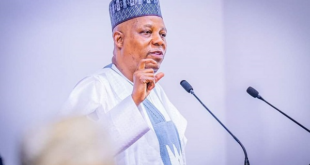By Cecilia Ologunagba
The Federal Ministry of Water Resources on Friday showcased some of the sanitation initiatives and services carried out by the Nigerian Government to achieve the Sustainable Development Goals (SDGs) target two by 2030.
SDGs Target 6.2 seeks actions to achieve access to adequate and equitable sanitation and hygiene for all and end open defecation, paying special attention to the needs of women and girls and those in vulnerable situations by 2030.
The News Agency of Nigeria (NAN) reports that the ministry showcased its initiatives and huge investment opportunities within sanitation and hygiene sector at an event on the margins of the 2023 UN Water Conference in New York.
The event, with the theme “Catalysing the Circular Sanitation Economy to deliver on SDGs 6.2”, was co-hosted by the Government of Nigeria, the Sanitation and Hygiene Fund (SHF), and the World Toilet Organisation (WTO).
In his remarks, the Minister of Water Resources, Alhaji Suleiman Adamu, said the national programme to end open defecation in the country, tagged the ‘Clean Nigeria: Use the Toilet’ campaign, had yielded results.
He said the programme is progressively gaining traction and accelerating access to sanitation services in the country with a State-wide and 100 LGA-wide Open Defecation Free (ODF) status recorded in 2022.
“Aside this, there are additional over 38,000 certified ODF communities across the country, achieved under the demand generation through the Campaign.
“Our collaboration with WTO and SHF is seeking to build a thriving national sanitation economy by attracting investors and creating the needed enabling environment for sanitation and hygiene businesses to thrive.
“This will help in bridging the gap between demand generation and the supply chain for delivering services.
“With the support of the Sanitation and Hygiene Fund, Nigeria is taking forward the gains from the Summit by working towards unlocking our sanitation economy,’’ the minister said.
According to him, from the 2022 Report, the Sanitation Economy and Menstrual Hygiene Marketplace in Nigeria is estimated at US$6.9 billion in 2021, with the potential to grow to US$14.3 billion by 2030.
These, he said, could generate positive, measurable social, economic and environmental impact alongside promising financial returns as Nigeria engages in shaping the market, building exciting partnerships and harnessing the investment opportunities.
Adamu told the gathering that the ministry is in the process of developing pipeline of investable market-based propositions, intended to facilitate investment into the sanitation economy and menstrual health marketplace.
He expressed optimism that with the support of partners, the ministry could align investors to the right opportunities and design innovative finance instruments to de-risk the investments and maximise the impact of funding from its partners.
“We understand the need to remove the barriers and incentivise investments if we are to achieve the economic potential as highlighted in this report.
“In this regard, we are putting in place concrete plans on key public reforms required to address the bottlenecks and strengthen the enabling environment that will attract new and greater investments into the sanitation economy and the menstrual health marketplace,’’ the minister said.
He also said that the Nigerian Government had consistently demonstrated the required strong political commitment to sanitation and hygiene issues and was poised to play the critical role of local and regional leader in developing innovative solutions for the Sector.
The minister said the Nigerian Government is poised to play a critical role in developing innovative solutions, leveraging the momentum generated by the 2022 World Toilet Summit, which it organised with over 14 countries in attendance.
Regrettably, the minister said progress in achieving SDG target 6.2 is among those still lagging behind globally.
He said that an estimated quadrupling of the current rate of progress with the concomitant resource commitments is required globally to meet up with the 2030 target date.
According to him, Nigeria will need to triple the current investment in the sector to meet the target by 2030.
NAN reports that the UN Water Conference, which opened on Wednesday, ended on Friday with a call for inclusive and action-oriented commitments to put safe, secure, sustainably and smartly managed water and sanitation within reach of every person on earth.
(NAN)
Subscribe to the Advocate News letter and receive news updates daily in your inbox.
 Advocate.ng Latest news update on politics, entertainment, sport and more
Advocate.ng Latest news update on politics, entertainment, sport and more




